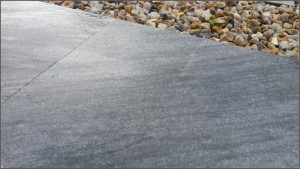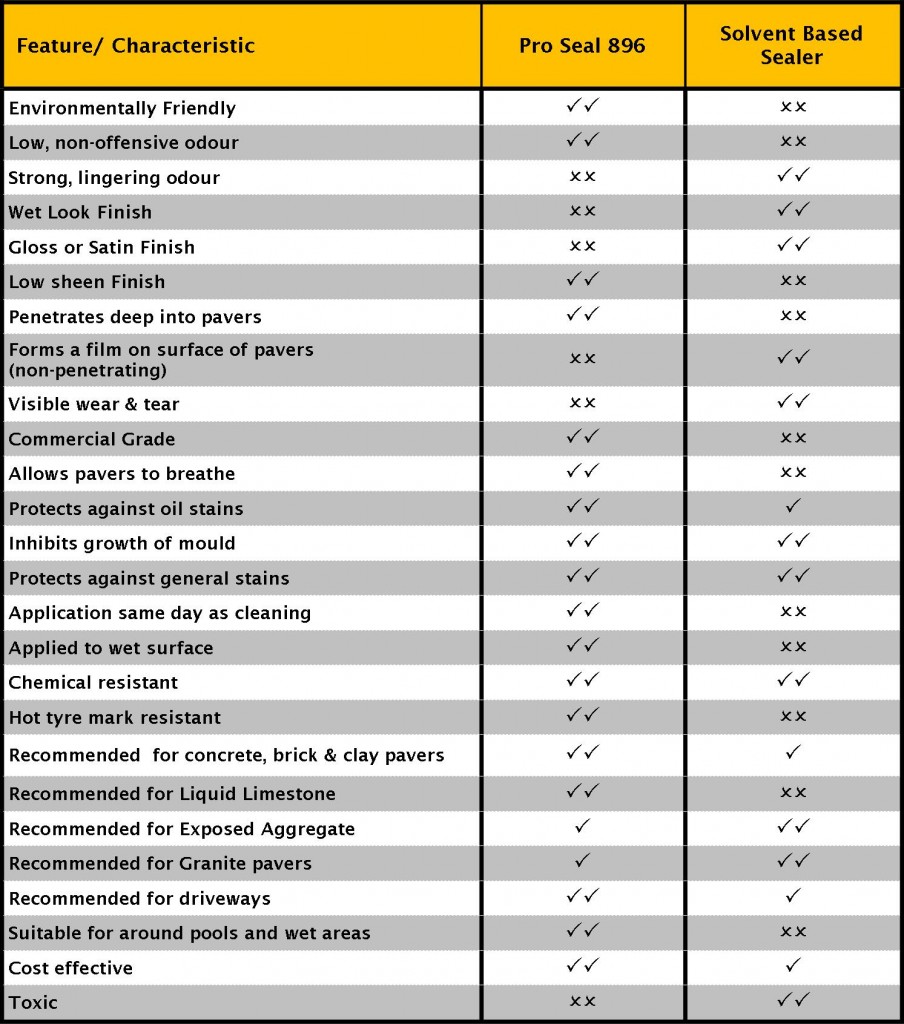Water Based Sealer vs Solvent Based Sealer
What is a solvent?
In chemical terms a solvent is defined as ‘a substance in which a solute is dissolved to form a solution’. The most common and abundant solvent on the earth is actually water. Seawater is a solution; its solvent is water and its solute is the salts in the seawater.
What? So a water based sealer is actually a type of solvent sealer?
Chemically speaking that is the case, but in many chemical industries (mostly paints and other coatings) the word solvent has been hijacked and used as a generic abbreviation for an ‘oil based solvent’.
What does a sealer solvent do?
With any type of sealer the solvent is a substance that keeps the sealer molecules in a liquid form that can be applied to a surface. During the drying process all the solvent evaporates away to leave the sealing molecules behind in a solid form. For ease of application most acrylic sealers will not contain more than 25% solids or they will become too thick to apply. This in turn means that the majority (at least 75%) of your sealer will disappear into thin air as it dries out.
Why should solvent evaporation concern me?
For two very important reasons:
- Health and Safety – As the solvent dries it disappears into the air. Breathing air is something that is non negotiable for most of us. If you need to have a solvent floating around in the air you breathe would you rather it be water vapour, or an oil based solvent? Airborne oil based solvents are referred to as volatile organic compounds(VOCs). VOCs have many documented health side effects which vary with solvent type and concentration. Most commonly these include VOC’s generally have a strong odour and are often noticeable for at least a week after application. Xylene is one of the most common VOCs. Below is an excerpt taken from the toxicology information section on a xylene material safety data sheet:
- Inhalation: Vapor causes respiratory tract and mucous membrane irritation. May affect central nervous system and behavior (General anesthetic/CNS depressant with effects including headache, weakness, memory loss, irritability, dizziness, giddiness, loss of coordination and judgement, respiratory depression/arrest or difficulty breathing, loss of appetite, nausea, vomiting, shivering, and possible coma and death). May also affects blood, sense organs, liver, and peripheral nerves.
- Cost – water is much cheaper than xylene or other oil based solvents. Therefore, if you have a water based sealer and an oil (solvent) based sealer of comparable quality, the water based product will be cheaper to produce and therefore you get more for your dollar. There is also considerable savings in terms of distribution costs because water based products can often be shipped in concentrated form (everyone has water to dilute) and oil based products are usually classified as hazardous and therefore require more stringent transportation requirements.
But aren’t solvent based sealers better quality?
There was a time when this was the case. About 50 years ago all paints were ‘solvent’ based. The first water based paints developed did not meet the same quality as the long established solvent based products and as such got a bad name. That bad reputation has proven hard to shake and is a commonly held belief in many circles still today. The improved health benefits and ease of clean up were big enough reasons to continue research and development. Over the years there has been big improvements in quality, appearance and durability. At present about 80% of residential paint sales are for water based products.
Dollar for dollar water based sealers can provide superior quality to oil based sealers. Mr Blastit has spent many years trialling numerous water and solvent based sealers. Our goal is always to find the best possible products to provide to our customers. In 90% of cases water based products are the best solution.
When is a solvent based sealer a better option?
There are many different sealers available today so it is not wise to think of all water based sealers being superior to oil based sealers. The advice we provide here is for the select few products that we have managed to narrow down to ‘best in class’. If you are standing in Bunnings trying to make a decision one way or another our advice is not to ignore the water based products but to know that they are likely as good if not better than the solvent equivalents for their recommended applications.
Ask us about our professional outdoor surface sealing service.
In terms of the sealers Mr Blastit uses there are a number of instances where water based sealers may not be suitable. The most significant of these is in terms of appearance. To date we have not been able to find a water based sealer that can give a significant or consistent enhancement to depth of colour. If you know of such a product please let us know. Therefore in instances where a darkened wet look finish is desired a solvent based wet look sealer is the safest and most reliable option for achieving such an appearance.
Below you will find a table comparing the attributes of our best quality water based sealer (Pro Seal 896) and solvent based sealers:


